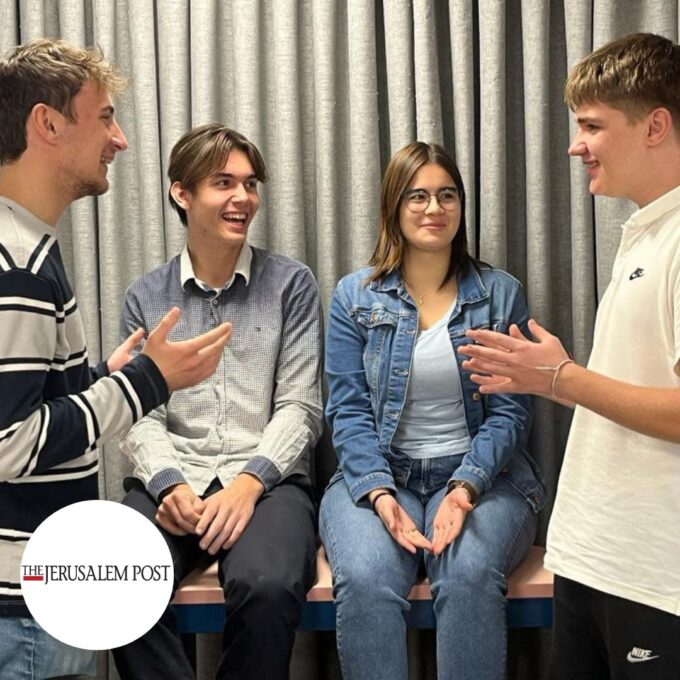19 August 2009 ORT school is in Lithuanias top 10 A survey published in Lithuanias equivalent of Newsweek magazine has placed the Vilnius ORT Shalom Aleichem School among the Baltic states top 10 high schools. But the schools increasing popularity means it is now operating at maximum capacity and an increasing number of Jewish children face having to be educated elsewhere unless the money is found for a new building. The school was ranked ninth in the survey of Lithuanias top 500 schools by Veidas magazine and was ranked third amongst the capitals schools. The Principal of what is Lithuanias only state-funded Jewish school, Misha Jakobas, said World ORTs support had been central to the schools improving performance in recent years. We can be proud of this result because this is an absolutely independent survey. This is a real sign of the success of our school, a recognition of our progress, Mr Jakobas said. In 2002 we received modern equipment that no other school in the country had when the ORT Technology Centre [funded by The Ronald S. Lauder Foundation, Dr Jean and Teri de Gunzburg and Mauricio Merikanskas] opened and that enabled us to improve our programmes. Shalom Aleichem student Karmela Blank. Since then, World ORTs continued support, culminating in last years introduction of Nova5000 date loggers and sensors to create intelligent laboratories together with teacher training to ensure the equipments effective use had contributed to Shalom Aleichems steady rise up the ranks. Shalom Aleichem is the only school in Lithuania to have such state-of-the-art teaching tools. In 2004, the school was placed 108th in the magazines national rankings but by 2007 it was 46th and up to 27th last year. The fact that Shalom Aleichem qualified for the survey is in itself a sign of the schools superior standards given that almost all the other schools listed are gymnasia the education systems top band of high schools. Despite the schools increasingly successful partnership with World ORT, Mr Jakobas said the number one slot was out of reach. Our school will never become the top school in Lithuania because those at the very top have very competitive selective entry criteria whereas we accept all Jewish children regardless of ability. We provide our students with a level base on which to start learning and help them realise their potential, he said. The commitment to the students is mirrored by the affection and appreciation expressed by the students. Grade 8 student Karmela Blank, who this year took third place in the Vilnius maths Olympics, said: I like to study at my school because it has wonderful teachers whom we can always ask for help. There are no ethnic or religious tensions at our school and the atmosphere is very warm. Karmela also appreciates the data loggers, Interactive Whiteboards and other facilities which she says are particularly useful in maths, science and IT lessons. Fellow Grade 8 student Arthur Kastanov added his appreciation for the up-to-date computers which they use for IT lessons but also voiced enthusiasm for the Jewish studies. I like learning about Jewish things because they are new and interesting for me, Arthur said. I have learnt much about the Jewish people, about their dramatic history and I am starting to speak and to write Hebrew. The ever higher standards achieved at Shalom Aleichem is the pride of the Jewish community and is a key factor in the schools increasing popularity among parents. However, Mr Jakobas says the current enrolment of 275 students which, by law, includes both Jewish and non-Jewish children has put the school at the limit of its resources. We cant take any more students and that means Jewish children will attend other schools, he said. We need a new building. We are currently using a building that was originally intended for a kindergarten and it has no room for a gym and other facilities. We cant go on in such conditions but although we have written dozens of letters to the authorities seeking assistance we have received nothing. To solve our problem we would need about $1 million. Yet Shalom Aleichem has to cope with a significantly reduced budget because of the on-going problems in the Heftsiba programme, which provides for Jewish Studies, the bolstering of teachers wages and for security at 44 Jewish schools including 17 ORT institutions in the Former Soviet Union. The situation is very difficult but all honour to ORT for their help. We will struggle on with Gods help, Mr Jakobas said. Mr Merikanskas, the Chair of World ORTs Board of Trustees, is the schools principal supporter. I am very pleased to hear this excellent news. But I am not surprised: knowing Misha Jakobass and his teams dedication, I knew that they would soon achieve great things. I congratulate everyone at the school and at World ORT, and I take note of the necessity to provide more capacity, Mr Merikanskas said.

ORT school is in Lithuanias top 10
19.08.09




